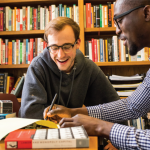Economics | University of Missouri – Kansas City
The M.A. in Economics program at UMKC provides rigorous training in core concepts and methods, as well as exposure to cutting edge developments in the field. The Department offers training in Institutional, Post-Keynesian, Marxist, Feminist and Ecological Economics. It is also the home of Modern Monetary Theory (MMT).
How does the programme provide content to ensure students achieve an understanding of a reasonably diverse set of perspectives on understanding economies?
UMKC faculty are proud of the department’s long tradition of pluralism, including a variety of perspectives and intellectual traditions. This translates itself into a curriculum that provides a critical understanding of mainstream economics as one of many theoretical approaches. In addition to standard courses, students are required to take courses in Institutional, and Post-Keynesian Modern Monetary Theory (MMT) economics. They follow this up with electives that present Marxian and other political economy approaches, ecological economics; courses on race, class and gender; history of economic thought, economic history, and others.
How does the programme ensure students understand the interaction between economic and ecological systems?
How does the programme ensure students understand how to critically explore real-world evidence, both qualitative and quantitative?
In addition to providing a good foundation in theoretical approaches, many of the required courses direct attention to a critical analysis of qualitative and quantitative data. The Econometrics course emphasizes the skills and knowledge to conceptualize and carry out empirical projects and employ the statistical and graphical programming environment R. Four of the five required courses require students to analyze real-world qualitative, and/or quantitative data. In addition, some popular electives are Geographical Information System (GIS) in which students learn to produce spatial data to analyze urban development, and Law and Economics in which students analyze contracts and employment, and economic damages using statistical tools.
What pedagogical approaches does the programme use to ensure that students examine the historical context, assumptions and values in all economic thinking?
The faculty are a diverse group of scholars who employ multiple pedagogical approaches, and are committed to pluralist thinking and maintaining an open and friendly environment for junior scholars and students. Students are challenged to think about ontology and epistemology, institutional structures, and historical context of contemporary events and moments. The graduate student body is vibrant and supportive of each other and organizes weekly brown bag discussions and outside speakers that offer new thinking on socioeconomic and theoretical puzzles. Many faculty and students are involved in policy work, popular economics education, and translating their intellectual work for the larger community. The faculty and student body are committed to learning both within and outside the classroom.
How does the department ensure that the teaching culture and capacity to deliver economic pluralism are continually improving?
The Department of Economics at UMKC is deeply committed to economic pluralism, offering different theoretical approaches in its repertoire of required and elective courses. Students and faculty are involved in organizing and policy work in Kansas City, nationally, and internationally. This work keeps teaching and scholarship relevant to the needs of the student community and beyond, and this is integral to the department’s culture.
Other information:
The M.A. in Economic at UMKC provides a critical pluralist understanding of economics. It prepares students for successful careers in business, finance, public service, or for doctoral studies.
Country:
USA
University:
University of Missouri-Kansas City
Course name:
Economics
Department/school:
Department of Economics
Course level:
Taught Masters
Course language:
English

 all programmes
all programmes